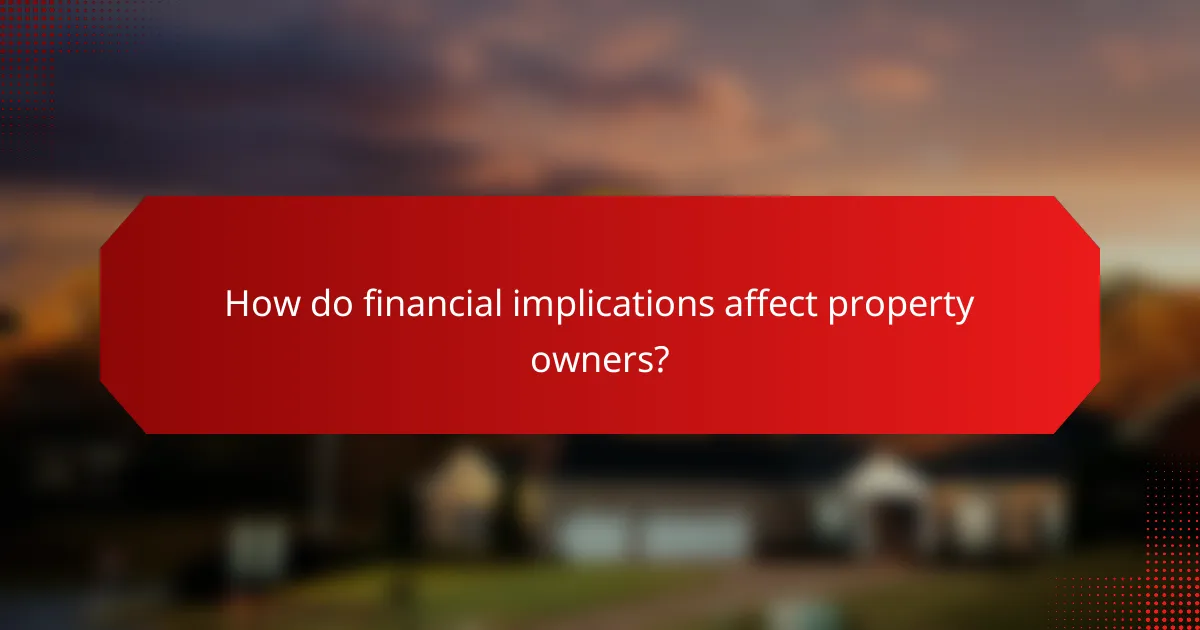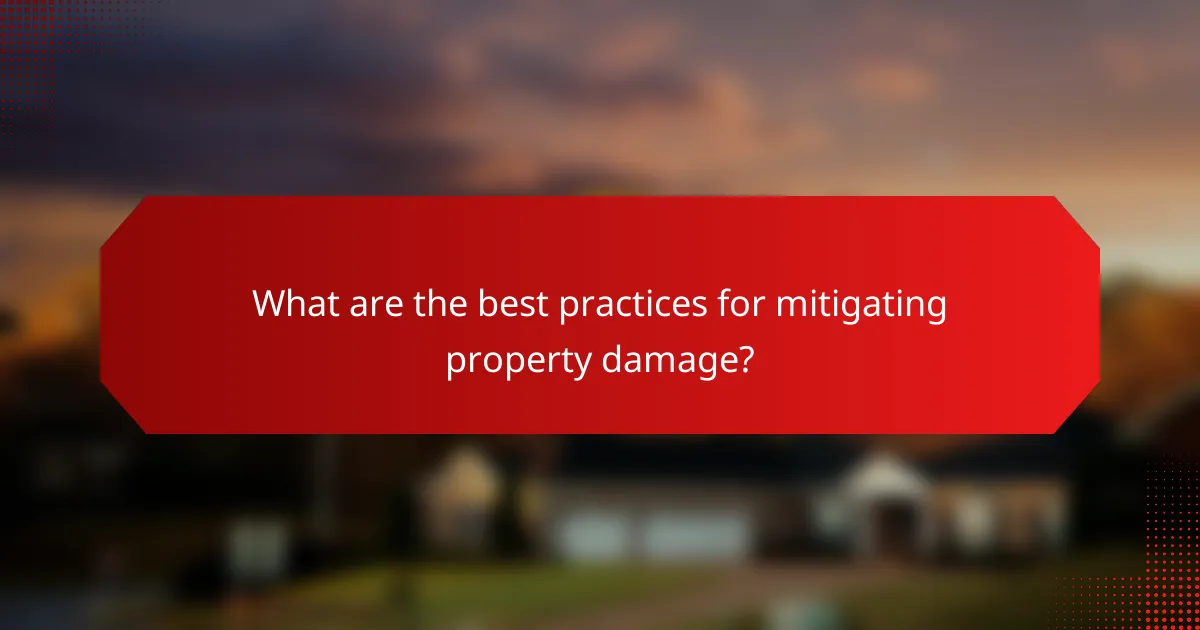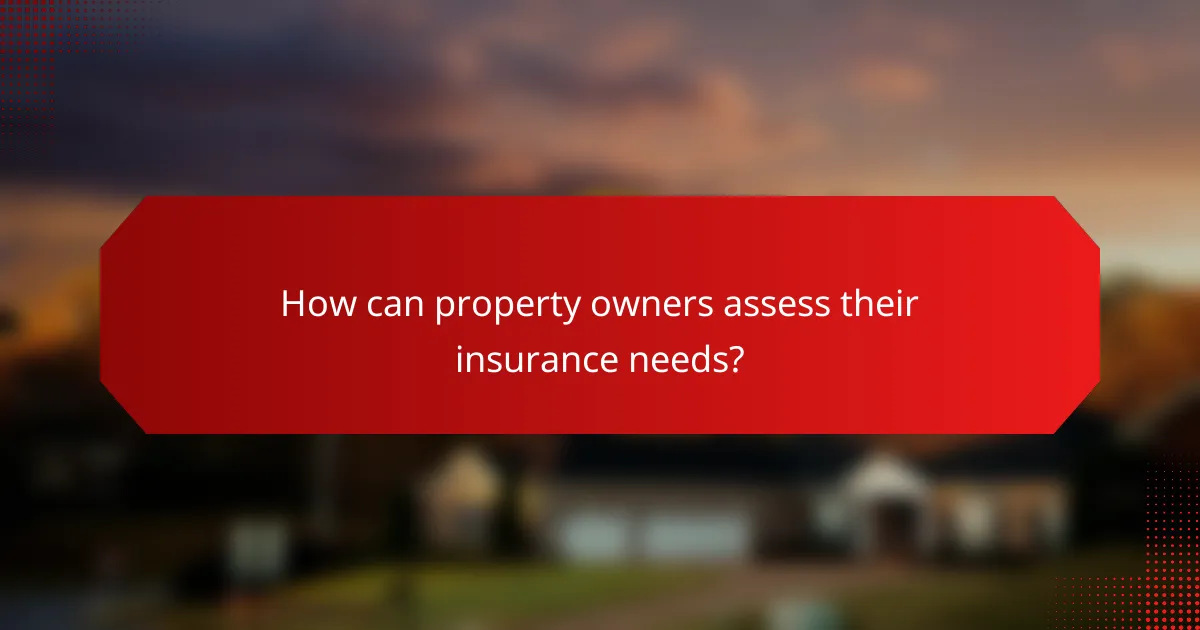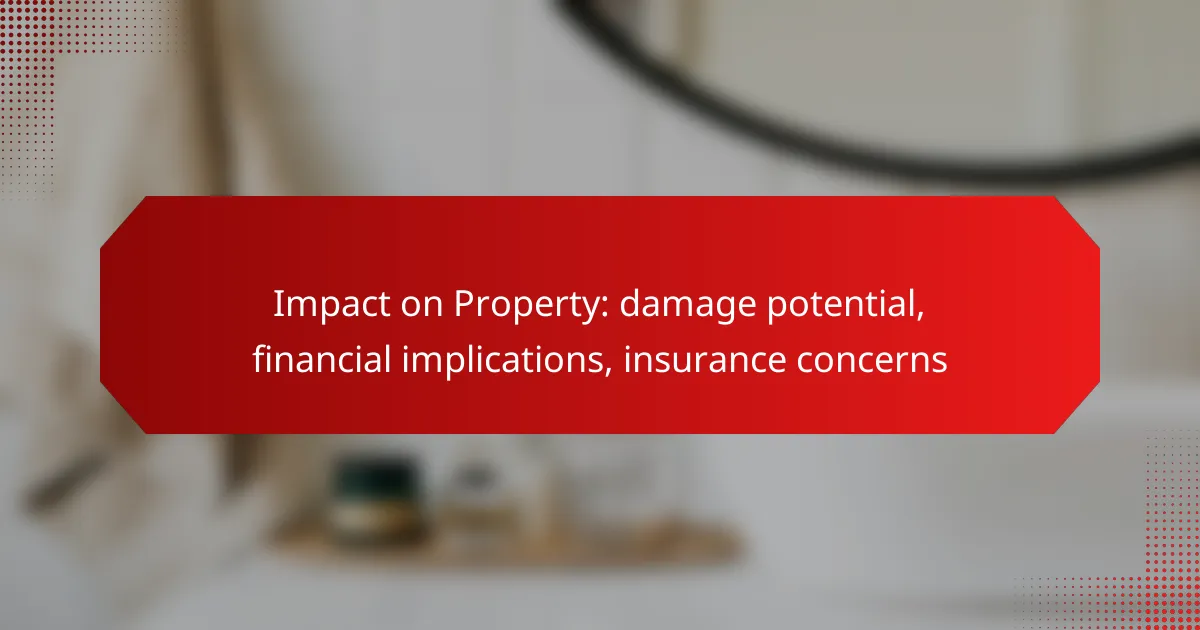The impact of environmental factors on property can lead to significant damage, with severe weather events, flooding, and wildfires posing serious risks. Property owners must understand the financial implications of these risks, including repair costs and property values, to make informed management decisions. Additionally, navigating insurance concerns is essential for ensuring adequate coverage and protecting financial security against unforeseen damages.

What are the potential damages to property in the UK?
In the UK, potential damages to property can arise from various environmental factors, including severe weather, flooding, and wildfires. Understanding these risks is crucial for property owners to mitigate financial implications and ensure adequate insurance coverage.
Structural damage from severe weather
Severe weather events, such as storms and heavy winds, can cause significant structural damage to buildings. Roofs may be compromised, windows shattered, and walls weakened, leading to costly repairs. Property owners should regularly inspect their properties for vulnerabilities and reinforce structures where necessary.
To minimize risks, consider investing in storm-resistant materials and maintaining trees and vegetation around your property to prevent falling branches. Keeping up with local building regulations can also help ensure your property is better equipped to withstand severe weather conditions.
Water damage from flooding
Flooding can lead to extensive water damage, affecting both the interior and exterior of properties. This may include damage to foundations, electrical systems, and personal belongings. In the UK, areas prone to flooding often require specific insurance policies to cover potential losses.
To protect against water damage, property owners should assess their flood risk, install sump pumps, and ensure proper drainage systems are in place. Additionally, storing valuables above ground level can help mitigate losses during a flood event.
Fire damage from wildfires
While wildfires are less common in the UK compared to other regions, they can still pose a risk, particularly in rural areas during dry spells. Fire damage can devastate properties, leading to complete loss and significant financial implications for homeowners.
To reduce the risk of fire damage, property owners should create defensible space by clearing flammable materials from around their homes and maintaining a well-watered landscape. Regularly checking smoke alarms and having a fire safety plan in place can also enhance preparedness against potential fire hazards.

How do financial implications affect property owners?
Financial implications significantly impact property owners by influencing repair costs, property values, and long-term liabilities. Understanding these factors is crucial for effective property management and investment decisions.
Cost of repairs and restoration
The cost of repairs and restoration can vary widely based on the extent of damage and the materials required. For instance, minor water damage might cost a few hundred USD to fix, while extensive fire damage could run into tens of thousands. Property owners should obtain multiple quotes from contractors to ensure competitive pricing.
Additionally, consider the potential for hidden damages that may not be immediately visible, which can increase overall repair costs. Regular maintenance can help mitigate these costs by addressing issues before they escalate.
Impact on property value
Damage to a property can lead to a decrease in its market value, sometimes by a significant percentage. Properties that have experienced severe damage may be viewed as less desirable, impacting resale potential. For example, a home with a history of flooding may sell for 10-20% less than comparable homes without such issues.
To protect property value, owners should invest in timely repairs and consider enhancements that improve resilience against future damage. Keeping thorough documentation of repairs can also help maintain value when selling.
Long-term financial liabilities
Long-term financial liabilities can arise from ongoing maintenance costs, increased insurance premiums, and potential legal issues related to property damage. For example, properties in disaster-prone areas may face higher insurance rates, which can strain budgets over time.
Property owners should assess their insurance coverage regularly to ensure it adequately protects against potential liabilities. It may also be beneficial to explore risk mitigation strategies, such as investing in disaster-resistant features, to reduce long-term costs.

What insurance concerns should property owners consider?
Property owners need to be aware of various insurance concerns that can significantly impact their financial security. Key considerations include coverage limitations, potential premium increases after claims, and the importance of having comprehensive policies to safeguard against unexpected damages.
Coverage limitations in high-risk areas
In high-risk areas, such as those prone to flooding or earthquakes, insurance policies often come with specific coverage limitations. For example, standard homeowners insurance may not cover flood damage, requiring separate flood insurance. Property owners should carefully review their policies to understand what is and isn’t covered, as this can lead to substantial out-of-pocket expenses in the event of a disaster.
Additionally, some insurers may impose higher deductibles or exclude certain types of damage altogether in these regions. It’s crucial to assess the risks associated with your location and ensure that your insurance adequately protects your property against those specific threats.
Premium increases after claims
Filing a claim can lead to increased insurance premiums, which is a common concern for property owners. Insurers often view claims as an indicator of higher risk, resulting in premium hikes that can range from modest to significant. For instance, a single claim for water damage might increase your annual premium by 10-20% or more, depending on the insurer and the nature of the claim.
To mitigate this risk, property owners should consider maintaining an emergency fund for minor repairs instead of filing claims. This approach can help keep insurance costs stable while ensuring that you have the necessary funds available for unexpected issues.
Importance of comprehensive policies
Having a comprehensive insurance policy is essential for protecting property owners from various risks. Comprehensive policies typically cover a broader range of incidents, including theft, vandalism, and natural disasters, which can provide peace of mind. Without adequate coverage, property owners may face substantial financial burdens in the event of an unforeseen incident.
When selecting a policy, it’s advisable to compare different options and consider endorsements or riders that can enhance coverage. For example, adding a rider for valuable personal property can ensure that high-value items are fully protected. Regularly reviewing and updating your policy can help maintain adequate coverage as your property and circumstances change.

What are the best practices for mitigating property damage?
Mitigating property damage involves proactive measures to protect your assets from potential harm. Implementing best practices can significantly reduce the risk of damage and the associated financial implications.
Regular property inspections
Conducting regular property inspections is crucial for identifying potential issues before they escalate. Inspections should focus on structural integrity, roofing, plumbing, and electrical systems. Aim for quarterly checks to ensure that any signs of wear or damage are promptly addressed.
During inspections, document findings and prioritize repairs based on urgency and potential impact. For example, a small roof leak can lead to extensive water damage if not fixed quickly.
Investment in preventative measures
Investing in preventative measures can save significant costs in the long run. This includes installing quality roofing materials, using water-resistant paint, and reinforcing windows and doors against storms. Such upgrades can reduce the likelihood of severe damage during adverse weather conditions.
Consider also installing security systems and fire alarms, which can help mitigate risks from theft or fire. These investments not only protect your property but can also lower insurance premiums.
Emergency preparedness plans
Creating an emergency preparedness plan is essential for minimizing damage during unexpected events. This plan should outline steps to take in various scenarios, such as natural disasters or fires, and include contact information for emergency services and insurance providers.
Regularly review and practice the plan with all occupants to ensure everyone knows their roles. Having a well-prepared team can significantly reduce response times and potential damage during crises.

How can property owners assess their insurance needs?
Property owners can assess their insurance needs by reviewing their current coverage and understanding the risks associated with their property. This process involves evaluating existing policies and consulting with professionals to ensure adequate protection against potential damages and financial losses.
Evaluating current coverage
Start by reviewing your existing insurance policies to identify what is covered and what is not. Check for coverage limits, deductibles, and any exclusions that may apply, especially for natural disasters or specific types of damage.
Consider the value of your property and its contents. If your property has appreciated significantly or if you’ve made substantial improvements, you may need to increase your coverage limits. A common guideline is to ensure that your coverage reflects at least 80% of the replacement cost of your property.
Consulting with insurance experts
Engaging with insurance professionals can provide valuable insights into your specific needs. They can help you understand the nuances of different policies and recommend options tailored to your property type and location.
When consulting experts, ask about potential risks in your area, such as flooding or earthquakes, and how they affect your coverage requirements. Additionally, inquire about discounts for bundling policies or implementing safety measures that could lower your premiums.
